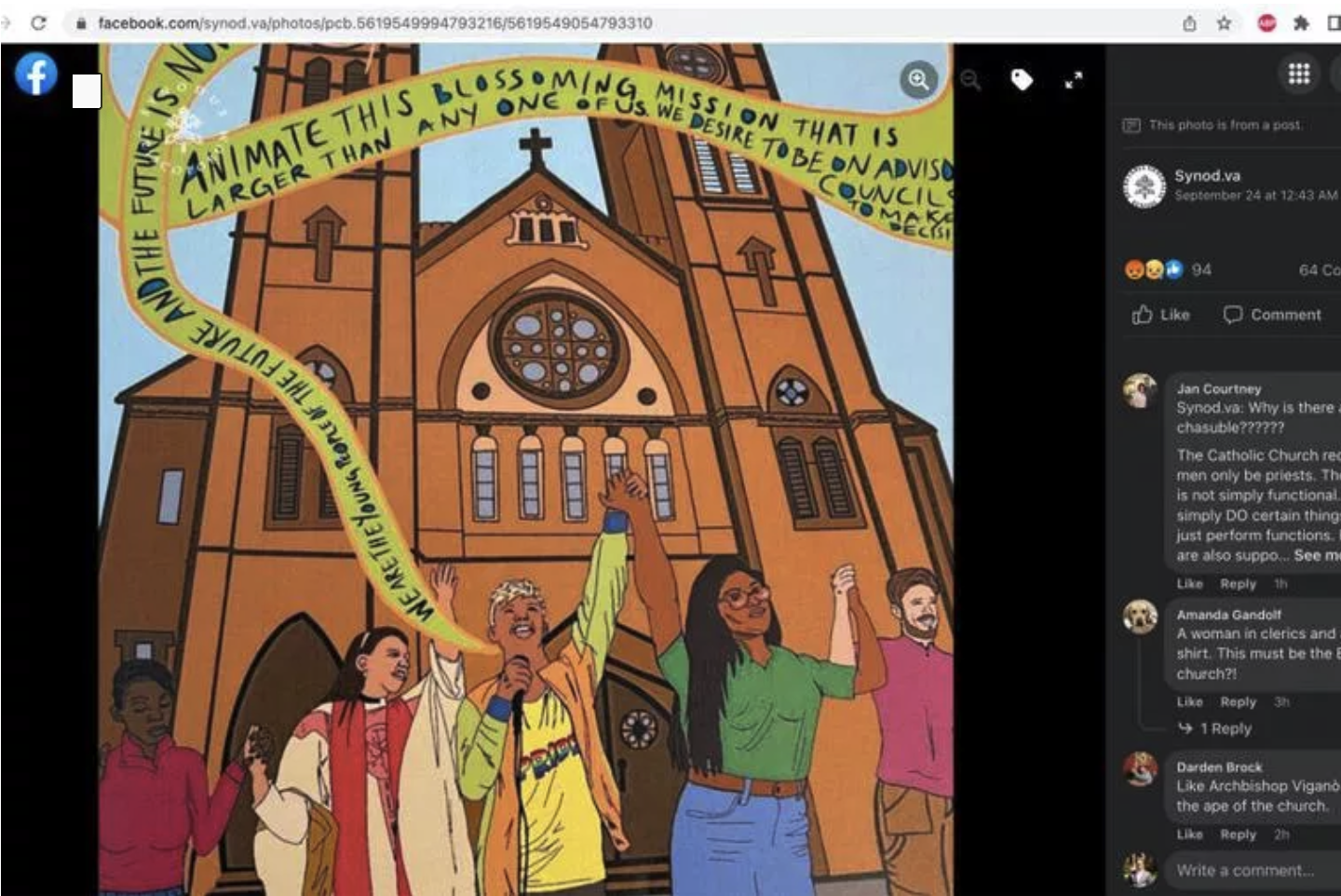The "Chain of Discipleship" image showed five Catholics celebrating at a church, including a woman in priest's vestments and a person in a rainbow-letters "pride" shirt who is shouting, "We are the young people of the future and the future is now."
This art from the Philadelphia Catholic Higher Education Synod rocked Catholic social media -- especially when it appeared on the Synod of Bishops Facebook page, linked to the ongoing Synod on Synodality that began in 2021.
Catholics at the local, regional and national levels are sending the Vatican input about the church's future. A North Carolina parish submitted testimony from "Matthew (not his real name)," who had been recognized as his Catholic high school's most popular teacher. While "hiding his homosexuality," he married "his partner elsewhere."
"They decide to foster, love and adopt young children internationally," said this report. "Matthew's greatest sadness is that he has to hide his sexuality in order to keep his job in a church institution and that he does not feel welcome in the Catholic Church precisely because of his sexuality which he considers God-given, and this despite his attempt to love the poor and destitute through his pro-life decision to adopt."
Case studies of this kind recently led Belgian bishops to approve a document -- "On Pastoral Closeness to Homosexual People" (.pdf here) -- containing a rite for priests blessing same-sex couples. The bishops appointed a gay layman as inter-diocesan coordinator for LGBTQ care in a land in which 3.6% of baptized Catholics attend Mass on an average Sunday.
Meanwhile, it's important that a Vatican working document includes the term LGBTQ and even LGBTQIA in discussions of topics once considered forbidden, said Francis DeBernardo of New Ways Ministry, a Catholic gay-rights network pushed aside during the Pope St. John Paul II era.
"The fact that LGBTQ inclusion was raised in this document indicates that this is a topic of global concern, not just the hobby-horse of some Western nations," he told the press. During New Ways Ministry synod meetings, LGBTQ Catholics showed "their willingness to participate in the life of the church they love so much. … They trusted that Pope Francis truly wanted to hear from them."
While Catholic progressives have hailed synodality as part of the "Spirit of Vatican II," a powerful voice from the pontificate of Pope Benedict XVI believes some elements of this process resemble an "occupation of the Catholic Church," or a "hostile takeover of the Church of Jesus Christ."
Some synod leaders believe "doctrine is only like a program of a political party" and they can "change it according to their votes," said Cardinal Gerhard Mueller of Germany, former leader of the Congregation for the Doctrine of the Faith. The result is a process resembling the "hermeneutic of the old cultural Protestantism and of the modernism" in which "individual experience" has the same level of authority as the "objective revelation of God," he told EWTN.
It's crucial that, under Pope Francis, the Congregation for the Doctrine of the Faith in 2021 said church authorities do not have the power bless same-sex unions, said Cardinal Francis Arinze, former Prefect of the Congregation for Divine Worship and the Discipline of the Sacraments.
"This is what the Flemish Bishops, and indeed all bishops and priests, should be teaching. They should be blessing, not homosexual couples, but properly married unions of one man and one woman," said the Nigerian cardinal. "Human beings have no power to change the order established by God the Creator. … This includes calling people to repentance, sacrifice, chastity and perfection."
The word from Belgian bishops is different -- that Catholicism is learning and evolving through contact with modern believers seeking change on marriage, sexuality, divorce and the ordination of women, argued Father Jos Moons, a Jesuit professor at University of Louvain.
"The Flemish Church is repositioning itself," he argued, writing in La Croix, an independent Catholic newspaper in France. "The bishops opt for warm, pastoral closeness, without judgments, warnings and prohibitions."
The synod document, he stressed, is "fully Roman Catholic" built on Amoris Laetitia ("The joy of love"), a 256-page document by Pope Francis. "The Flemish bishops emphasize conscience. By this they mean the personal dialogue with God, which forms itself in dialogue with Church teaching, fellow believers, society and one's own inner self."
FIRST IMAGE: Screen shot from Vatican.va


